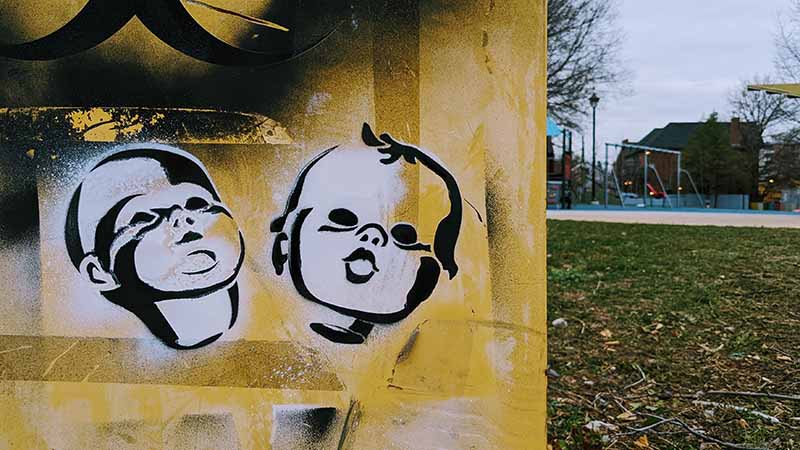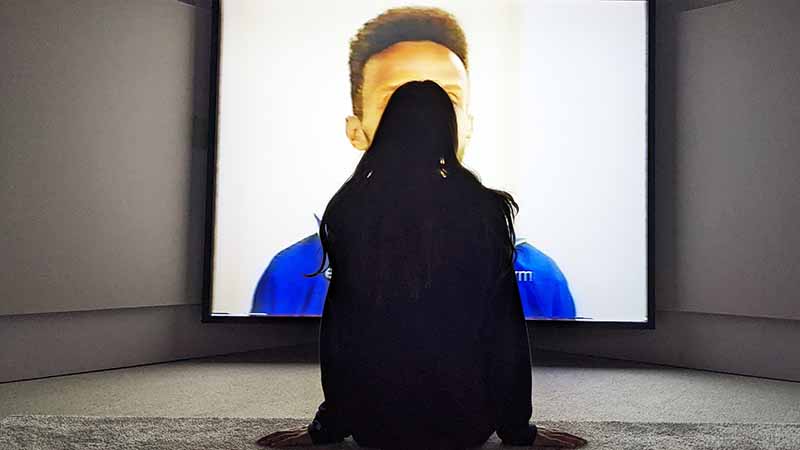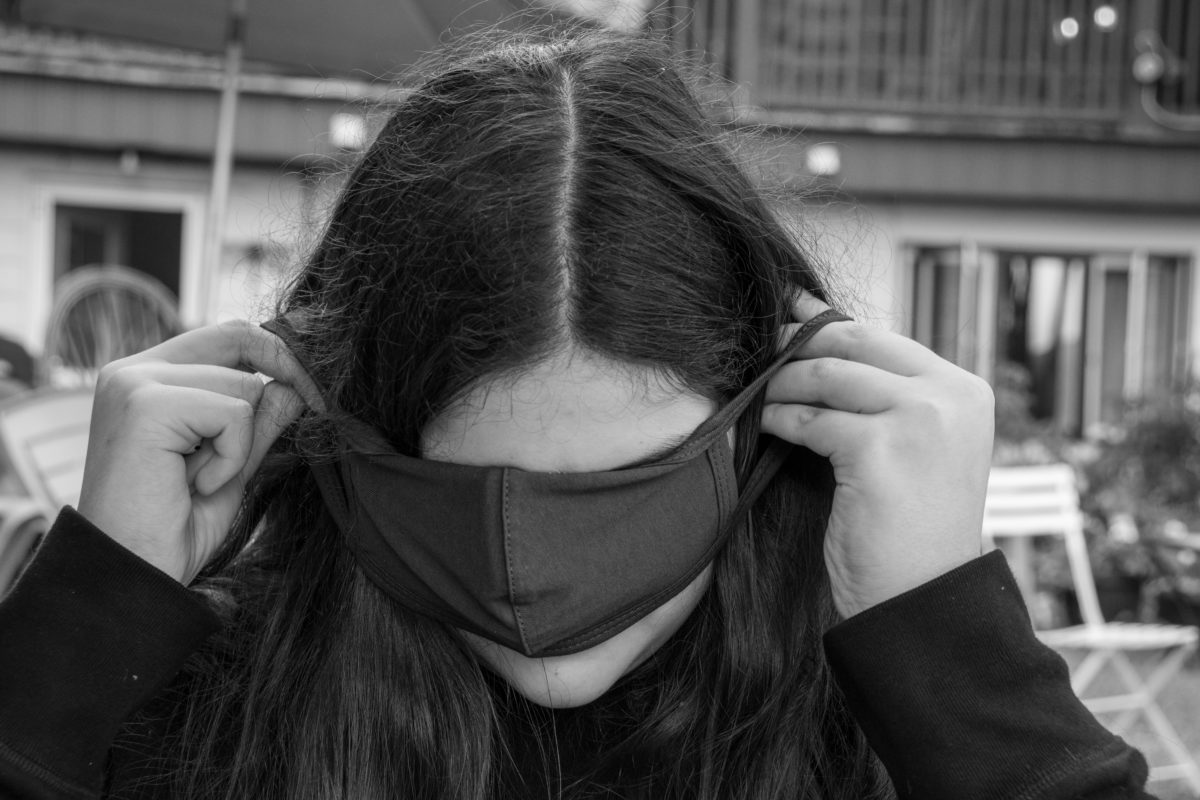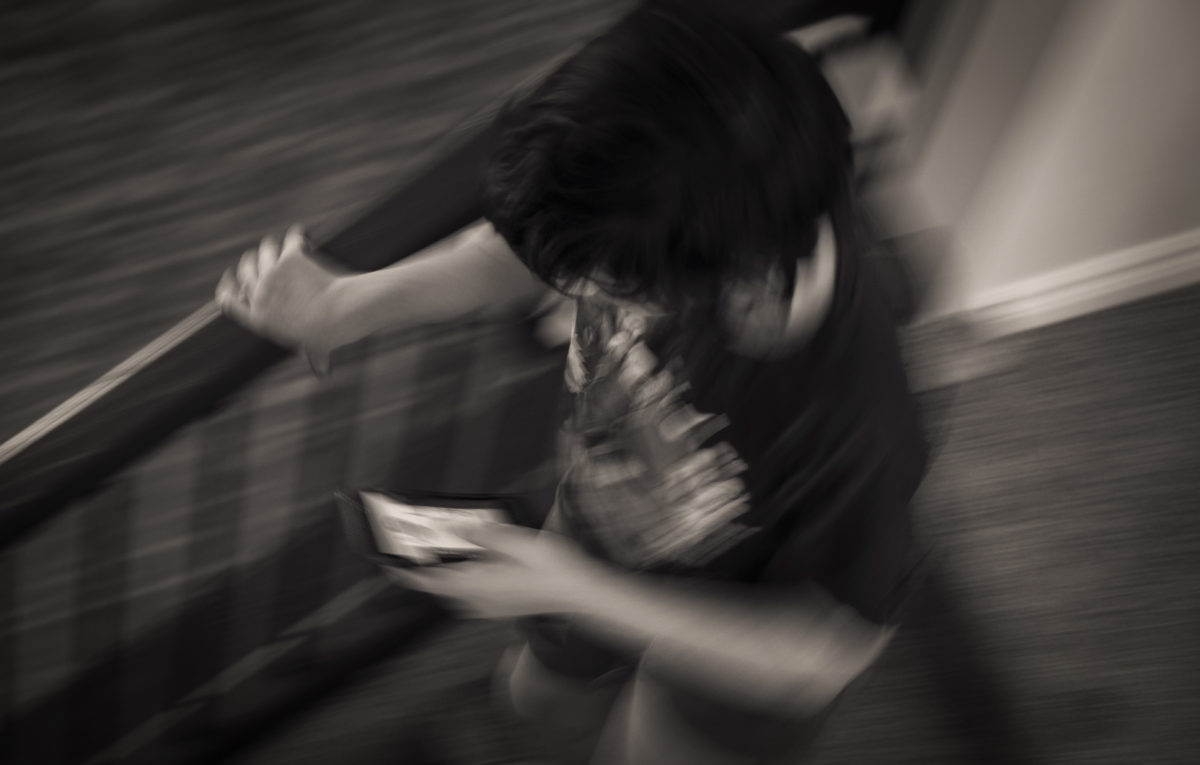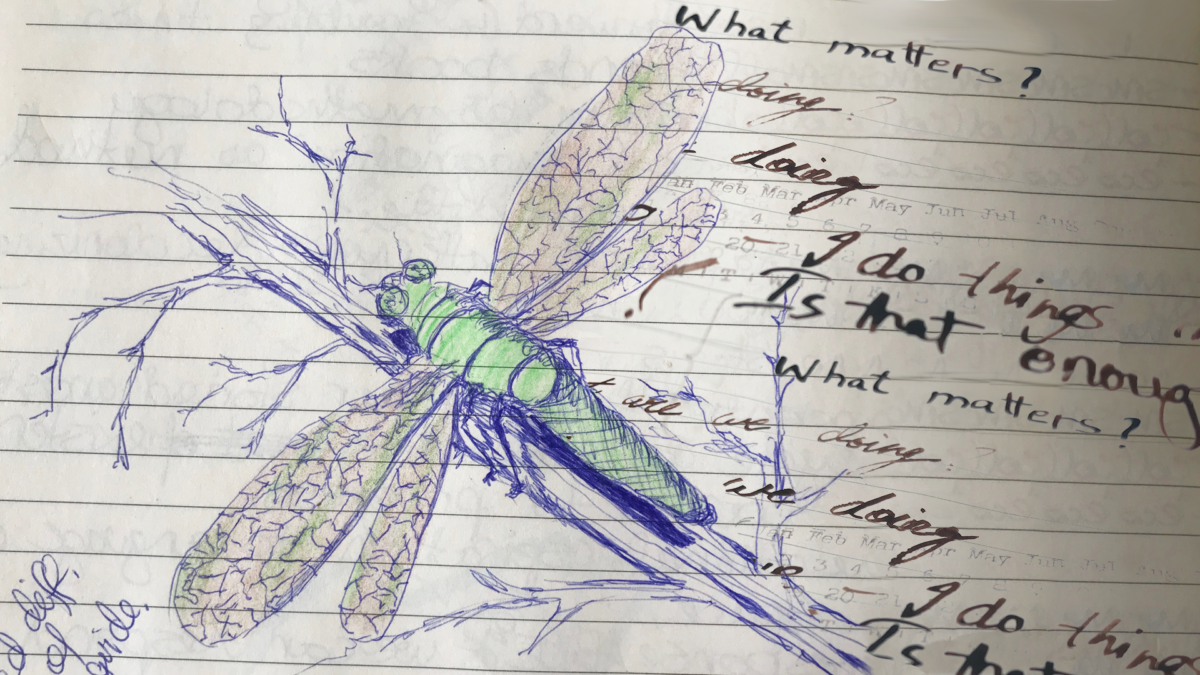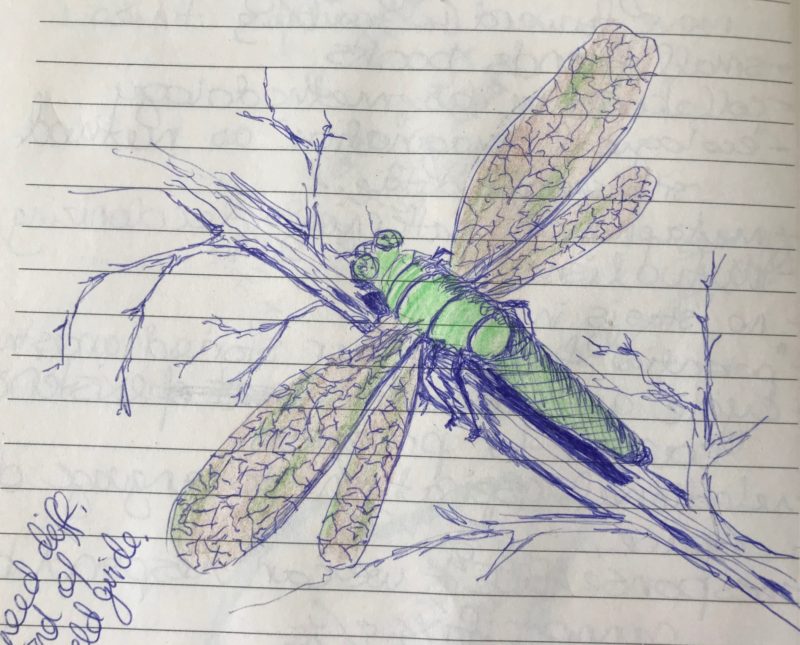Kathleen Kummen (Ph.D, ECE) is the Co-Director of BC Early Childhood Pedagogy Network and the Chair of the School of Education and Childhood Studies at Capilano University .
Barbara Pytka (RECE) is a College Professor in the School of Early Childhood Education at Seneca Polytechnic.
¹ The use of the term “actors” was inspired by the Actor Network Theory. Tara Fenwick writes extensively on the use of Actor Network Theory in education. She suggests that our realities are an enactment of many actors working together in assemblages. For further exploration of Fenwick’s work visit Fenwick (2010).
Barbara: In his book “The Burnout Society,” Byung-Chul Han (2015) suggests that our society is preoccupied with achievement and productivity. The obsession with the never-satisfying drive for optimizing achievement and performance leads us to a level of a pathological state. This state includes burnout, depression, hyperactivity, profound boredom, sameness and becoming “achievement-subjects” (p. 8). We willingly challenge ourselves to become the best we can be and there is never a finish line. These dispositions are amplified by the lauding of agreeableness and positivity so much so that we have become accustomed to responding with “yes, we can” to all our life’s demands (Han, 2015, p. 8). According to Han, these dispositions are internal rather than external forces that propel us toward becoming “entrepreneurs” of ourselves (2015, p. 8).
Undoubtedly, the culture of achievement and productivity has found its way into early childhood education preparatory programs. It is true, now more than ever, that college professors are pressured to ensure that their “yes, we can” capacity is unlimited. From my experience, in their already abundant lists of responsibilities, college professors believe that their success depends on their continuous positive response to the pressure to achieve. For example, today’s college professors agree to work longer hours to learn to use constantly changing technological tools to teach students in various delivery modes, such as in-person and online, both synchronous and asynchronous. They push themselves to better support the overwhelming number of international students studying Canadian early childhood education.
As achievement subjects, college professors in early childhood education urge themselves to learn and innovate their assessment methods in response to ever-changing societal technical developments, such as the introduction of ChatGPT. They also willingly exploit themselves in consulting many students who leave the early childhood program after experiencing the current state of post-COVID-19 programs for young children in their practicums.
How do you think a culture of achievement, productivity, and entrepreneurs in early childhood education programs contributes to the formation of students’ professional identity, and what influence may it have on the future of the field?
Kathleen: You have asked a critical question that requires all of us in education to consider the current conditions that necessitate starting a conversation around the education of future educators and thinking about a culture of achievement, productivity, and entrepreneurship. This is an important reminder that early childhood education and the education of future educators are deeply related to the social, political, and technological conditions of our times. A recent article written by the Early Childhood Pedagogies Collaboratory (2023) problematized the narrative that investment into early childhood education is essential to ensuring the growth of the Canadian economy. Their concern is that when the dominant public conversation around implementing a Canada-Wide Early Learning and Child Care program privileges economic concerns instead of educational issues, we neglect to think about early childhood education as a project of world and citizen-making. When focusing on economic growth, early childhood education is reduced to an instrumental economic endeavor, ignoring the field’s rich possibilities.
In 2014, Cristina Delgado Vintimilla wrote about how she was often questioned by her colleagues and others for introducing students to neoliberalism in early childhood education classes. Her response was to make visible how neoliberalism functions in and regulates early childhood education conditions that make possible very particular ways of being an early childhood educator. Your question requires us to carefully think with Vintimilla to articulate how the economic constructs of neoliberalism and its social consequences permeate early childhood education and produce educators that understand education from that perspective. Once we have a clear understanding of what occurs when education is an economic issue, we can work to make space for pedagogical matters in education. We can then ask more relevant and urgent questions, such as how we might co-construct curriculum that responds to the conditions of 21st-century educators.
Barbara: I agree that we need to clearly understand what is jeopardized when conceptualizing education as an economic issue. For me, we first need to identify and acknowledge the important roles of the many actors involved in the universalization of the present early childhood system. In particular, I would like to discuss community colleges as preparatory institutions for educators and powerful actors in the field.
As you know, in Ontario, in accordance with the College of Early Childhood Educators’ 2021 report, 95% of educators working with children and their families enter the field with only a two-year college diploma. There is no incentive for educators to continue their education above the basic preparatory level and pursue opportunities to enhance their academic dispositions (attitudes associated with commitment to lifelong learning). Focusing only on the college diploma in early childhood education is problematic, as community colleges are “focused on meeting the needs of the economy” (Cox & Sallee, 2018, p. 74). This is manifested in aims to produce registered early childhood educators as quickly as possible, to meet shortage demands within the field. In this way, students’ learning is dependent on establishing quick and efficient processes that move students through schooling into the field as quickly as possible. Unlike the structure of university programs, in college programs, professors are pressured to produce workers through whatever means necessary (Dennison & Gallagher, 2014. p. 77), which often translates to making theoretical concepts “accessible”. For example, this might look like providing short and easy articles to students, using quizzes for testing, creating ready-to-use educational tools, such as checklists, templates and step-by-step directions, and constructing assignments rooted in memorizing standards, rules, and procedures.
What are your thoughts on the consequences of these instrumental, reproducible approaches to pre-service education for early childhood educators?
Kathleen: The assertion that teacher education merely recycles technical practices is not a recent concern. George Counts, in an editorial written in 1935 for the Teacher College Record, strongly criticized the increase in the length of teacher education from two years to four if the mechanistic emphasis on practicality over transformative practices were to remain. Over ten years ago, Kirylo and McNulty (2011), in their introduction to a special issue of Childhood Education, asserted that early childhood and elementary teacher education programs are facing unprecedented demands for change to meet the needs of children in the 21st century. They express concern that, unfortunately, this call for change is often met with practices that reflect “a belief that teaching is a technical skill—a belief they feel ignores “the complexity and political nature of teaching” (p. 316).
The consequence of a neoliberal approach to the education of future educators is that post-secondary programs are at risk of being implicated into practices that contribute to the deskilling of early childhood educators. I use the term deskilling, to imply the reduction of the knowledge, dispositions and skills that are considered necessary to work as an early childhood educator. As difficult as it may be, post-secondary instructors must come together to consider our obligations to our students and the young children they will work with. The knowledge, ideas, values, and beliefs privileged in post-secondary classrooms make possible the pedagogical practices that provide children with the types of educational spaces they deserve – or not. If we want students to become educators that respond to the conditions of 21st-century life, then we, as their educators, need to create classrooms that nurture specific student dispositions.
As the educators of educators, we should be asking: what are the practices of our post-secondary classroom that contribute to our students engaging in practices that are ethical, situated, or meaningful when they become educators? How are we taking up the practice of critical reflection in our own pedagogical choices in the post-secondary classroom and collectively as departments when we are making curricular decisions? For example, let’s consider a course that has, as a learning objective, to consider how societal values and beliefs (e.g., gender, race, and culture) affect educational practice. As educators we need to reflect on how we are taking up this objective in pedagogical practices that make visible and disrupt the taken-for-granted assumptions all of us hold around children and childhood. Dahlberg, Moss, and Pence (2013) argue that if we disrupt these dominant discourses of children, childhood might more easily be recognized as a social construct and children might more easily be seen, not as universal entities, but as complex, diverse, and, at times, contradictory. This recognition would make space to open the possibility of multiple ways to provide early childhood education programs for children and families. The question, then, is how might we as educators curate the conditions that will support students in an inquiry to displace or unhinge taken-for-granted notions of children and childhood. How do we create the pedagogical conditions so that students can engage in a process of collective learning, that like any inquiry worth its salt, makes spaces for new questions and curiosities that are unexpected, and disrupt our thinking in unanticipated ways?
As professors, I think we have an obligation to create early childhood education programs where students can conceptualize early childhood as a space to create more livable worlds for children rather than a space to ‘prepare’ children for kindergarten or keep them safe and occupied so that parents and caregivers can work. We are responsible for creating the conditions for students to become those educators.
Barbara: Let’s discuss now the relationship between neoliberal logic in education and anti-intellectualism. I am referring to practices and structures that focus heavily on ingraining limited traditions (e.g., developmentalism) and policies and regulations established by external governing bodies; practices that limit the role of educators to the application of technical and scientific conceptions. As Vintimilla et al. (2023) suggest, such existing structures in early childhood education not only strengthen anti-intellectualism, but also create barriers for educators to envision and explore approaches that can influence the ways we think and do pedagogy. If we accept the view that the purpose of early childhood education programs is to produce skilled, technical workers, then it follows that the approaches used in preparatory education don’t promote intellectual work or creativity. Here I am referring to both what students deem as relevant for their education and also the specific theoretical underpinnings college professors choose for their courses, acknowledging that there are specific governmental and institutional parameters they must adhere to. Based on my experience working with about 80 college professors, I have seen the pressure they face to structure early childhood education curricula to promote technical and reproducible objectives rather than a curriculum that promotes students’ intellectual curiosity. This technocratic curriculum is something that Bezaire and Johnston (2023) problematize when they talk about pre-service educators needing to learn through experiencing “complex, multifaceted, even contradictory roles” (p. 436) if they are to be prepared to respond to contemporary complex social issues.
What do you think is needed to shift in the work of college professors so students can strengthen their dispositions in becoming creative and innovative thinkers?
Kathleen: First, I would like to acknowledge that college and university professors work within complex governmental and administrative relations. As people who care deeply about children and families, they are aware of the unprecedented challenges to the field of early childhood education, such as the lack of childcare spaces and recruitment and retention issues. However, I strongly believe that as professors, these challenges should not take precedence over creating curriculum that pedagogically responds to the conditions of our times. I believe faculty need to attend to Cochran-Smith and Lytle’s (2006) argument that “the model of teacher development as training and retraining is retrograde and is inconsistent with contemporary understandings of teaching and learning” (p. 687–688). Acknowledging this requires us, as the educators of future educators, to engage deeply with literature, knowledges and practices that will support the reconceptualization of the education of future educators.
For me, the issue of concern in the education of early childhood educators is how to live/teach/research in a world of competing and contradictory discourses. How can we invite students to expect teaching (and perhaps life) to be what Jackson (2001) describes as a “wrenching, uneven experience” (p. 388)? We, as teachers of early childhood educators, need to create learning spaces that explore what it means to teach, live, and practice in an unstable, unpredictable, always emerging world.
For example, my colleagues Veronica Pacini-Ketchabaw and Denise Hodgins have been involved in a project in British Columbia called the BC Early Childhood Pedagogy Network, where part of our work is with student educators. We have introduced the role of faculty pedagogists, who work directly with educators in practicum sites and with students. The faculty pedagogists support educators and students to engage with children and families in innovative, critically reflective practice and extend the practice of the educators and the children by introducing new ideas and materials (Government of British Columbia, 2019, p. 7). This work is supported by current research in the education of future educators that calls for intentional and guided opportunities for students to reflect on their observations of and practices with young children in early childhood education settings (e.g., Avgitidou et al., 2013; Bowne et al., 2010 Brown and Englehardt, 2016). In an article, Denise and I wrote, we talk more deeply about the process of creating the conditions for students to build relationships that create the conditions to think together about ideas and theory (Kummen & Hodgins, 2019).
One of the things that has emerged from this work is the importance of practicum for student educators. Practicum is often considered secondary to the theory courses or other courses taught on campus and positioned as sort of a means to an end for students to meet requirements to successfully complete the program. Suppose we truly want to reconceptualize both early childhood education and the education of early childhood educators. In that case, we need to conceptualize practicum as one of the most significant courses in their education as future educators and one that is deeply connected to curriculum and pedagogy. Within the ECPN, we have expanded the Dedicated Practicum model developed at Capilano University in North Vancouver, British Columbia, in what we call our Post-Secondary Stream of Pedagogists.
In this model, students experience practicum at the same practicum site for one academic year, which is quite different from other practicum structures, where students are encouraged to have multiple practicum sites so that they can see a little bit of everything. By working in the same early years program, not only do the students develop long-term relationships with children, but they also come to know and be part of the life of that centre. By working with the same mentor teachers and faculty, students have the time and opportunity to engage deeply in curriculum with children and educators. The Dedicated Practicum model allows students to think with educators and children to curate experiences, select materials and so forth so that there is deep engagement with ideas and concerns that matter in that centre. This model helps students see pedagogical work as more than providing activities that keep children busy and safe while their parents are at their place of employment. By becoming immersed in the life of a centre, students can engage with pedagogy as life-making (Vinimilla & Pacini- Ketchabaw, 2020).
Barbara: Recruitment and retention of early childhood educators have created new challenges for the field and for colleges and universities. As McCuaig et al. (2022) pointed out in their report, 82% of child care operators in Canada have been experiencing difficulties with recruiting qualified educators. In Ontario, “licensed child care has the lowest retention rate of any employment setting” (College of Early Childhood Educators, 2021, n.p.). For that reason, there is a push to graduate more students to meet the demand for educators in the field, so much so that full-time domestic students receive bursaries of $2,000 per semester to complete the program (Seneca Polytechnic, 2023).
The retention and recruitment issue has also contributed to increasing numbers of international students in early childhood education (Admission Hub, 2021). The research on international students learning in Canadian colleges is limited. However, what we have learned from the early childhood education community in Australia is that, in addition to adjusting to the cultural differences in pedagogy (Rouse & Joseph, 2019), students are being challenged with navigating a new lifestyle (cost of living, linguistic differences, etc.) (Dai, Matthews, & Reyes, 2020; Yu & Wright, 2016). International students in early childhood education talk about being stressed, overwhelmed, and struggling to connect theory and practice (Rouse & Joseph, 2019). This is important, as educators’ capacity and attitudes, engagement, and emotional warmth are linked to children’s positive outcomes in future academic performance, behaviour, and health (McCuaig et al., 2022).
How are we to create spaces that welcome the diversity of students in our programs, and create the conditions to support their well-being and nurture the dispositions that allow them to meet the complex and situated needs of the children and families in the 21st century?
Kathleen: I am working in the province of British Columbia; I can attest that my colleagues at Capilano University and other post-secondary institutions are seeing an increase in pressure to offer accelerated and other programs that work to quickly put adults in early years programs. Often this involves programs in which adults receive an assistant certificate or a short training so that they are considered responsible adults. Also, with the introduction of our degree 13 years ago, we saw a rise in the number of younger students entering our program directly from Grade 12. However, education is a profession that obliges us to always be responding to the current conditions in which we find ourselves. This means that we need to attend pedagogically to the increase in the diversity of our students.
First, we need to celebrate that we are having more diversity and difference in our field. This increases the possibilities for young children to work with adults who share their language, have similar culture experiences and so forth. The last thing education in the 21st century needs is to perpetuate the ghost of Lady Bountiful (Ford Smith, 1993, cited in Harper & Cavanaugh, 1994), who haunts the elementary classroom and is also present in early childhood education, and who works to keep children innocent and pure. Harper and Cavanaugh (1994) describe Lady Bountiful as a representation of the white lady missionary or white lady teacher who emerged during the time of British imperialism (p. 42).
It also means that we, as educators of educators, need to recognize how our students’ geo-political position in the world shapes the ways in which they understand childhood, education, families and so forth. In our own classrooms and with our colleagues we need to seek to bring to the forefront the complexity of teaching that results from taken-for-granted understandings that mask the political, historical, and changing meanings of discourses. How are we ensuring that all early childhood students understand the genealogy of child development and its relationships with racism and colonization? How do we ensure that the colonization and the ongoing legacy of colonization are discussed in our classrooms in ways that don’t have settlers recounting the narrative? We need to ensure that as educators, we are meeting our obligations to the students in front of us in ways that will support them to undertake the complex work of the early childhood educator. I think the words in the Early Childhood Educators of BC Position Paper on The Role of the Early Childhood Educator might be generative to our discussion:
Current research asserts social policies and narratives maintain our profession as gendered, racialized, marginalized and positioned as a secondary market force. However, we know that early childhood educators are not limited by these narratives and images. Educators are leaders and hopeful for a better future, without knowing the shape of that future. Educators are emboldened to disrupt the legacies of the past in order to activate transformative change for the future. In relationship with children, families, communities, materials and places, educators engage in intentional pedagogical work in response to the complexity of our current conditions. Early childhood education is a space to co-create new worlds with alternative narratives.
Barbara: In addition to reconceptualizing practicum in the ways you outlined above, what specific actions can college professors take to counter current practices in programs that limit Ontario’s early childhood education field?
Kathleen: I am unsure I can respond to your question with specific actions that faculty should take in their classrooms because I am hesitant to offer suggestions that might lend themselves to instrumental practices. Instead, I encourage faculty to come together to engage in radical dialogues to think deeply about how they understand early childhood education; to unpack the discourses they hold around education, educators, and children so that they can critically reflect on their pedagogical practices. I use the term radical dialogue to refer to a style of conversation that Moss and Dalberg (2005) describe as dialogue that fosters conditions for the participants to work with an idea or concept in ways that unpack, disrupt, analyze, and question taken-for-granted assumptions so as to collectively reimagine alternative understandings. Doing this work means moving beyond sharing ideas to negotiate a consensus. Rather, it requires a commitment to labour collaboratively, to use the words of Vintimilla, “in the name of something” that is beyond the opinions and desires of the individual. As educators of future educators, it is critical that we formulate, reformulate, and negotiate pedagogical commitment for the post-secondary classroom.
Many of my colleagues at Capilano University were fortunate to work with Cristina Delgado Vintimilla, who, as a pedagogista, curated dialogues that helped us to come together to collectively articulate our image of the student educator, the educator, education and the child. Collective thinking is far from easy work and is often filled with challenges and tension. However, it was necessary for us, as educators, to nurture, individually and collectively, the dispositions to engage in radical dialogues to think pedagogically. For example, words such as neoliberalism, globalization, colonization and racism enter our classrooms in the student’s first term. Thinking with the work of Vintimilla (2014), students are introduced to education as a political project. We ask the students to think deeply about the concept of pedagogy as a form of life-making, and we collectively commit to working with the concept of education as a political project, to think together about the language, theories, and knowledges that we work with within our classrooms. When students are introduced to education as a profession that is not innocent and neutral, they understand that they have an obligation to consider what materials and experiences they would offer to children—recognizing that what happens in the classroom makes possible particular ways of being and knowing and silences or marginalizes other ways of knowing and being. Thinking with Barad (2012), I believe that what is needed in the education of future early childhood educators is a curriculum that attends to “how values matter and gets materialized, and the interconnectedness of ethics, ontology, and epistemology” (as cited in Juelskær & Schwennesen, p.15). Therefore, we need to think beyond activities and skills so that the education of future educators is taken up as an ethical and political project.
For me personally, I am inspired in my own teaching by the words of Rinaldi (2006) who asserts that the child requires an educator who is a “‘powerful’ teacher, the only kind of teacher suitable for our equally “‘powerful’ child” (p. 125). This powerful educator, Rinaldi explains, is open to the unexpected, is one who engages in learning with the child as a researcher in order to be open to possibilities in education. Perhaps this statement by Rinaldi can be a place for faculty to start a process of collectively reimaging the education of future educators. It is my hope that we as the educators of early childhood educator engage in what Lenz Taguchi (2010) refers to as ethics of immanence and potentialities to “transform educational practices so that they can be about challenging children’s, students’ and teachers’ potentialities and capacities to act and be inventive in the process of collaborative experimentation and production of concepts and knowing” (p. 177).
Barbara: Thank you for sharing your thoughts on the critical role professors play in the field of early childhood education. I hope this discussion will create a space for college professors and those involved in the construction and implementation of early childhood education programs to see why continuously reflecting on and revisiting their teaching methods, as well as making tangible changes that promote deep intellectual and pedagogical thought is important. I also hope that your provocations will serve as a catalyst to start disrupting old habits that normalize taken-for-granted practices in early childhood education to create space for new possibilities in the field. I would like to close with Nietzsche’s idea that a teacher’s role is to “learn to see, to think, and to speak and write” (as cited in Han, 2015, p. 21).
References
Admission Hub. (2021). Why should you study Early Childhood Education in Canada 2022? Canada Admission Hub
Avgitidou, S., Pnevmatikos, D., & Likomitrou, S. (2013). Preservice teachers’ beliefs about childhood: Challenges for a participatory early childhood education? Journal of Early Childhood Teacher Education, 34(4), 390–404. doi:10.1080/10901027.2013.845633
Bezaire, K. P., & Johnston, L. K. (2022). Stop “under-mind-ing” early childhood educators: Honouring subjectivity in pre-service education to build intellectual and relational capacities. Contemporary Issues in Early Childhood, 23(4), 435–451. doi: 10.1177/14639491221128242
Bowne, M., Cutler, K., DeBates, D., Gilkerson, D., & Stremmel, A. (2010). Pedagogical documentation and collaborative dialogue as tools of inquiry for preservice teachers in early childhood education: An exploratory narrative. Journal of the Scholarship of Teaching and Learning, 10(2), 48–59.
Brown, C. & Englehardt, J. (2016). Conceptions of and early childhood educators’ experiences in early childhood professional development programs: A qualitative metasynthesis. Journal of Early Childhood Teacher Education. 37(3), 216-244. doi:10.1080/10901027.2016.1204574
Cochran-Smith, M., & Lytle, S. L. (2006). Troubling images of teaching in no child left behind. Harvard Educational Review, 76(4), 668–697.
Cox, R. D., & Sallee, M. W. (2018). Neoliberalism across borders: A comparative case study of community colleges’ capacity to serve student-parents. The Journal of Higher Education, 89(1), 54–80. doi: 10.1080/00221546.2017.1341753
Dahlberg, G., Moss, P., & Pence, A. (2013). Beyond quality in early childhood education and care: Languages of evaluation (3rd Ed.): Routledge.
Dai, K., Matthews, K. E. & Reyes, V. (2020) Chinese students’ assessment and learning experiences in a transnational higher education programme. Assessment & Evaluation in Higher Education, 45(1), 70-81. doi: 10.1080/02602938.2019.1608907
Fenwick, T. J. (2010). (un)Doing standards in education with actor-network theory. Journal of Education Policy, 25(2), 117–133. doi: 10.1080/02680930903314277
Han, B.-C., & Butler, E. (2015). The burnout society (E. Butler, Trans.). Stanford Briefs, an imprint of Stanford University Press.
Harper, H., & Cavanaugh, S. (1994). Lady Bountiful: The white woman teacher in multicultural education. Women’s Education, 11(2), 41–49.
Jackson, A. Y. (2001). Multiple Annies: Feminist poststructural theory and the making of a teacher. Journal of Teacher Education, 52(5), 386–397. doi: 10.1177/002248710152005005
Juelskær, M., & Schwennesen, N. (2012). Intra-active entanglements—An interview with Karen Barad. Kvinder, Køn & Forskning, 1–2, 10–23.
Kirylo, J., & McNulty, C. (2011). Introduction: Teacher education programs in the midst of change. Childhood Education, 87(5), 315–317. doi:10.1080/00094056.2011.10523204
Kummen, K., & Hodgins, B. D. (2019). Learning collectives with/in sites of practice: Beyond training and professional development. Journal of Childhood Studies, 44(1), 111-122.
Lenz Taguchi, H. (2010). Going beyond the theory/practice divide in early childhood education: Introducing an intra-active pedagogy. Routledge
McCuaig K., Akbari, E., Correia, A. (April 2022). Canada’s children need a professional early childhood education workforce. Atkinson Centre for Society and Child Development, Ontario Institute for Studies in Education, University of Toronto.
Moss, P., & Dalberg, G. (2005). Ethics and politics in early childhood education. Routledge.
Ontario College of Early Childhood Educators. (2021). Licensed child care in Ontario. https://www.college-ece.ca/wp-content/uploads/2021/10/Licensed_Child_Care_2021.pdf
Rinaldi, C. (2006). In dialogue with Reggio Emilia. Routledge.
Rouse, E. & Joseph, D. (2019). The theory–practice challenge: International early childhood education students making connections in Australia. New Zealand Journal of Teachers’ Work, 16(1 & 2), 31–47.
Seneca Polytechnic. (2023). Bursary/Grant advancements.
Vintimilla, C. (2014). Neoliberal fun and happiness in early childhood education. Journal of Childhood Studies, 39(1), 79–87. doi: 10.18357/jcs.v39i1.15246
Vintimilla C. & Pacini-Ketchabaw, V. (2020). Weaving pedagogy in early childhood education: on openings and their foreclosure. European Early Childhood Education Research Journal, 28(5). 628-641. doi: 10.1080/1350293X.2020.1817235
Vintimilla, C., Pacini-Ketchabaw, V., & Land, N. (2023). Manifesting living knowledges: A pedagogists’ working manifesto. Journal of Curriculum and Pedagogy, 20(1), 4–13. doi: 10.1080/15505170.2021.1955051
Yu, B., & Wright, E. (2016) Socio-cultural adaptation, academic adaptation and satisfaction of international higher degree research students in Australia. Tertiary Education and Management, 22(1), 49-64. doi: 10.1080/13583883.2015.1127405
